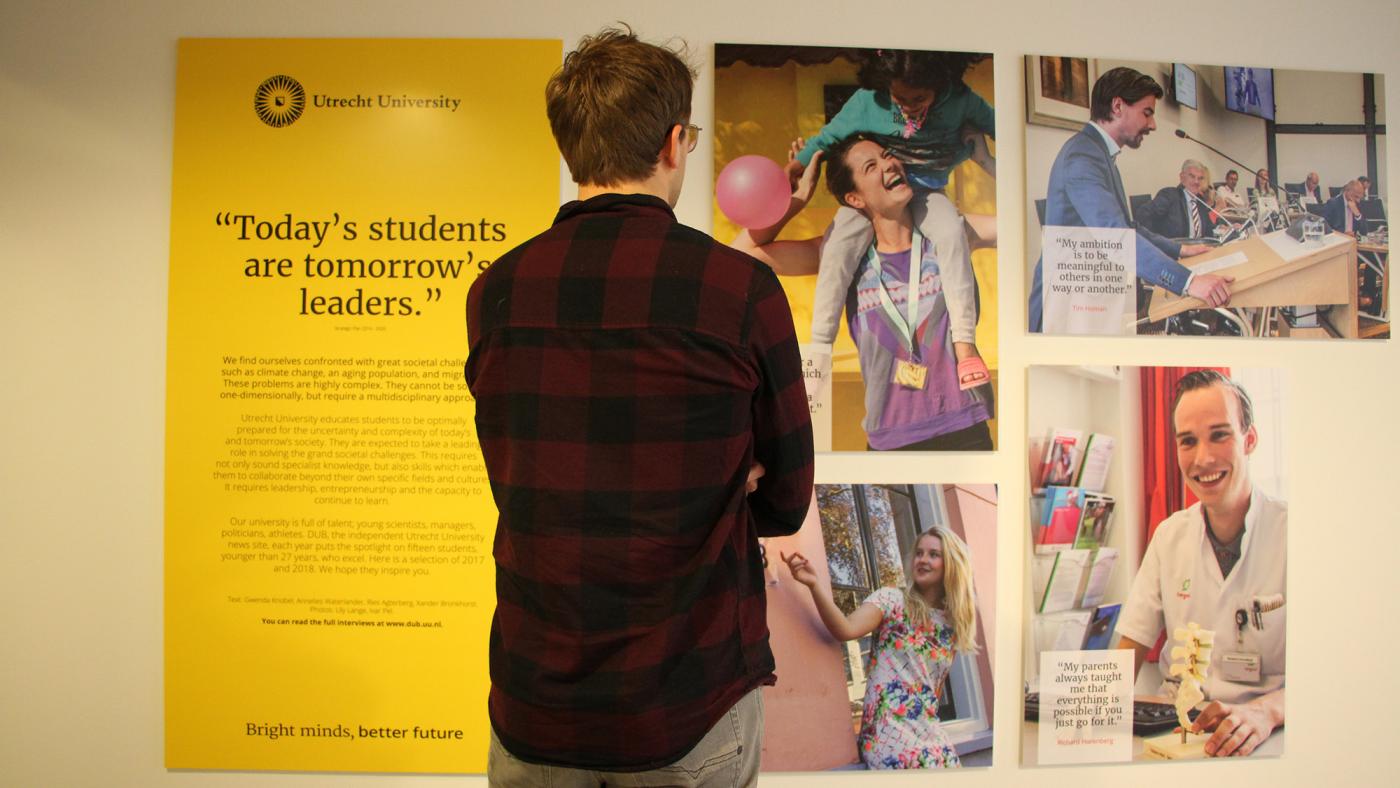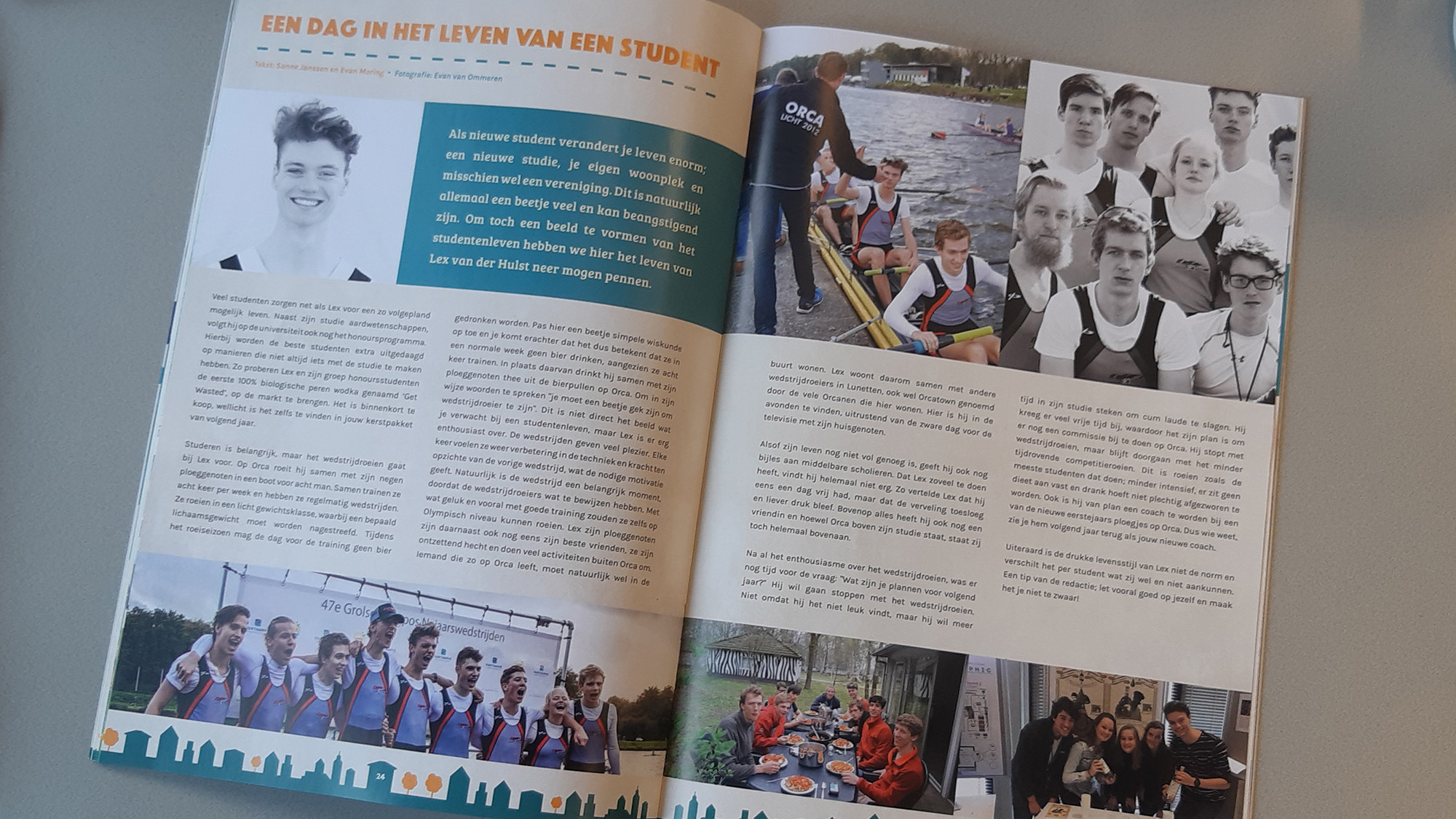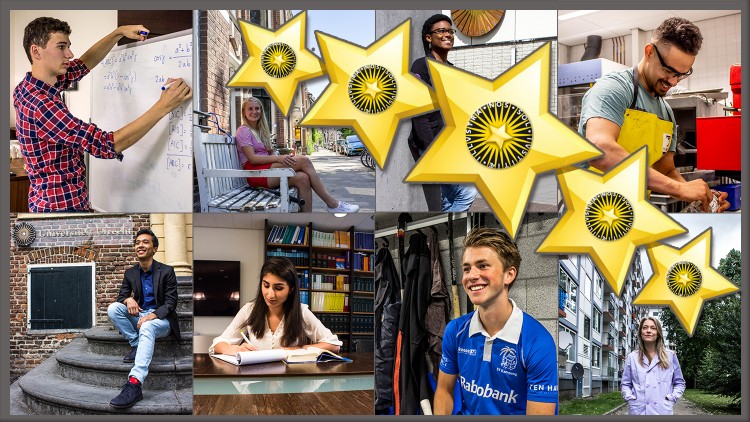‘Spotlight on excelling students causes other students stress’

A beautiful project. That’s what we at DUB think about the Promising Fifteen, in which we portray students who have achieved something remarkable in their studies, sports, or in other ways. The university was impressed, too. Starting this month, there’s even an exhibition with photos of these students in the Administration Building.
But a tweet this summer from UU professor of Governance, Paul Boselie, suddenly made made us feel we were completely on the wrong track. He wrote: "I genuinely feel this is wonderful and promising, but at the same time, I wonder what this does to all those other students from the viewpoint of pressure to perform?"
So, you shouldn’t put a spotlight on excelling students anymore, because that may lead to stress in other students? Should then the annual UU student awards be canned as well? Aren’t these types of initiatives meant to encourage and motivate other students?
“That’s where you’re wrong,” Boselie thinks. “You’re creating this image of students who can seemingly do everything. Should others mirror themselves to that? What messsage are you sending, in this day and age? Everything has to be perfect. You have to get good grades, fill up your cv, you have to do exotic things, and definitely never show your own failures and vulnerability. For most students, that’s already an impossible feat, and this imaging only leads to frustration and worse.”
It felt as though the president said: ‘See, self-development doesn’t have to mean sacrificing your studies’.
Aren’t I good enough? Master’s student and former University Council member Gwenny Jongebloed wondered last year, when she attended the ceremony for the UU student awards. “In his speech, president Anton Pijpers listed al the things winner Roos Ykema did. Then, he said she also managed to get good grades for the two studies she was doing: ‘A good example that shows extracurricular activities, studying, and self-development can go together.’ It felt as if he’d said: ‘See, self-development doesn’t have to mean sacrificing your studies’. It was as if I was such an idiot, because my studies are delayed because of my time as a board member of the study association, when of course that’s not the case. The reason Roos got that award, was because it’s exceptional that she can do both.”
“Of course you can showcase extraordinary students,” Gwenny thinks. “But the university should realise there’s a very fine line between motivating students and pressuring them. I experience that pressure because the university attaches so much importance to good study results with an award like this. Good grades are a prerequisite of being eligible for the UU student award. I feel like grades should come into play if a choice has to be made between students, but it shouldn’t bar you from applying for the award. The focus on excellent grades makes me feel like it’s not enough, what I’m doing. I did a year in the board, I was in co-determination, I have a part-time job, did committee work, and I’m in the Taskforce Student Wellness. But I ‘only’ have an average grade of a 7.”
It would help if the UU, in giving out the award, didn’t jut focus on results, but also on the road to those results.
Marieke de Bakker, head of Student Affairs, puts that idea of the high importance of grades in perspective, saying it’s not the case that award winners or student stories in academic media are always about students with good grades. “It’s not the case that you have to be good at everything to qualify.”
But De Bakker also says the UU has become more aware in the past few years of the fact that there’s a possible downside to portraying exceptional students. This was proven last summer, for example. Making sure not to portray a one-sided image of student life, the Taskforce Student Wellness, which was established last April, advised to put a disclaimer next to an interview with a student that was published in the UIT magazine.
The article, with its headline ‘A day in the life of a student’, talks about Earth Sciences student Lex, who wants to graduate cum laude, is a participant in an honours programme, competitive rower at Orca, tutors high school students, and has a girlfriend. “Many students, like Lex, create a life that’s as full as it can be,” the article says.
Gwenny: “We thought it was rather extreme to present his story as if it was an example of typical student life. That would’ve given freshmen the idea that it’s normal to do everything all at once.” For that reason, an addition was printed at the end of the article: “Of course, the busy lifestyle Lex has isn’t the norm, and what someone can handle differs from student to student.”
Continue reading below the photo

In the Taskforce Student Wellness, De Bakker and Jenny talk about options to use university communication not just for highlighting great examples of extraordinary performances by students, but also examples of other students. They’re also thinking about concepts like Fuck-Up Nights, where people share their mistakes and failures.
Gwenny thinks success stories that are “more complete” may relief some of students’ pressure. “It helps if the university, when presenting the student awards for instance, doesn’t just pay attention to the results, but also to the road to success. Let excellent students talk about how hard it was sometimes, that they had to struggle, or felt down.”
We at the university all think we have to educate the next Einsteins and CEOs. And they all have to get 9.0 grades.
De Bakker wouldn’t be a proponent of going entirely in the different direction, and not showcasing any students at all anymore. “The beauty of our student awards and DUB’s Promising Fifteen, is that we’re showing students who are talented in a multitude of ways. They’re inspirational stories about social involvement, entrepreneurship, creative talent, or contributing to the academic community. The university is and remains a beautiful place where young people can develop in many different ways, and where it’s important and interesting to share their stories.”
Boselie says that, despite the awareness and efforts made within the UU, there’s still a long ways to go. With the assistance of a Harvard-developed model, he explains that within organisations, there’s an ideal balance of three factors: effectiveness, individual wellbeing of employees, and social impact. He says the focus at the university is too much on effectiveness, or students’ achievements. “We at the university all think we have to educate the next Einsteins and CEOs. And they all have to get 9.0 grades. But that’s not always the best indicator – in fact, it can be harmful in other ways.”
Gwenny adds: “In the eyes of the UU, I’m not an excellent student, but I already don’t feel like I should be a role model for other students. Because I wouldn’t recommend anyone do this much during your studies, due to the unnecessary stress it can cause you.”
“Of course it’s a social phenomenon that we’re expecting more and more from our students, because they can’t take ten years to finish their studies anymore, and have to pay much more for their studies than they used to,” Gwenny acknowledges. “But the UU doesn’t have to add to that. A while back, I saw a great example in the newsletter sent out by the career service. It asked: ‘Are you always busy and stressed?’ I thought: yes, they’re finally introducing a training for stress management. But then it said: ‘Download the JobTeaser mobile app on iTunes or Google Play, so you can apply for jobs and internships on the go.” Gwenny laughs: “It’s little things like that that can add so much stress.”
Continue reading below the box.
 On Facebook, we asked our readers whether success stories like our Promising Fifteen cause them stress. Here are some of the responses:
On Facebook, we asked our readers whether success stories like our Promising Fifteen cause them stress. Here are some of the responses:Personally, I’m not really affected by an article like that, because there are so many success stories around you, that it disappears into the flow of interesting things fellow students do or have done.”
“All in all, it doesn’t seem like a bad thing to give out pats on the back once a year to those students who excel the most, as long as it’s also stressed that working yourself to the bone, or to a burn-out, isn’t the key to happiness.”
“Other students should stop whining.”
“I think we should learn that some things in life aren’t fun (to hear). Some people just perform better! And that doesn’t make your own life less fun?!”
“Mwah, I think you show very well there’s different ways of excelling. I at least thought it was a fun read.”
Boselie’s objections go beyond his concerns about students’ mental wellbeing. He fears a university who increasingly distinguishes between the ‘happy few’ and the ‘peripherals’. “You establish a kind of standard with these role models. If you don’t do this, you don’t belong here. It’s an exclusive approach. I prefer the inclusive way. Because in what way does the university contribute to society the most? It’s all these people who graduate with sixes and sevens. It’s those students who make the level of knowledge so high in the Netherlands. I feel like as a university, we’re better at grassroots than at the top level. That’s blasphemy, saying that here at a university that wants to belong to the world elite, and would love to be more selective about its students, but that’s the way it is.”
That slacker who only gets average grades might be a great musician or star athlete.
From his research on talent management, the professor knows that predicting who’ll have a successful career is next to impossible. “For fun, you should really take a look at those Promising Fifteen in twenty years. I wish them the best, and there’s every chance they’ll do fine, but there’s no guarantee they will be the captains of industry, the leaders of the future. Today’s winner might just be tomorrow’s loser.”
Boselie calls for a wider look on human capital. That doesn’t mean he wants a different appreciation of Dutch so-called ‘sixes culture’, in which students tend to slack just enough to only get barely-sufficient grades. “Sometimes, a 6 can be an excellent achievement. Every year, I’ve got at least one or two students in my Master’s who’ve done this whole track starting at mavo, continuing on to havo, hbo, and a pre-master track. Those students may not get the best grades, but they persevere. They might actually have a much bigger value to the Dutch labour market.”
Boselie: “To me it’s about not seeing the individual als the talent, but knowing every individual has talents you need to find. That slacker ‘sixes-student’ who only gets sixes as grades might be a great musician, or a star athlete. Some of my students spend their weekends managing an entire Albert Heijn store, or work as commander at the volunteer fire brigade. That’s fascinating to me. What is talent, really? It’s much more than the student who wins the UU student award.”
That should also come with more trust in students’ development, Boselie thinks. “Universities barely give students any room to experiment, to colour outside the lines. They hardly have time to find out where their talents and ambitions lie, and they’re already done with their studies by age 22.
I don't believe the UU doesn't appreciate the 'sixes-student'
Marieke de Bakker only partially recognizes the picture Boselie paints. “I don’t believe the UU doesn’t appreciate the ‘sixes-student’ who’ve come a long way, have to work really hard, or have care duties at home. I see many teachers, tutors, study advisers and student deans who are really involved, who are so proud when a student – sometimes after years of struggling – graduates.”
She does acknowledge the university has put a lot of emphasis on passing your courses and graduating in time. But that was partially due to the government and politics demanding universities do so. “There’s also a positive side to this: if there’s a system of study loans instead of grants, universities should help make sure students can finish their studies in time.”
“But we need to keep an eye out for side effects,” De Bakker adds. “If many students feel like grades are the only thing that matters, then we’re doing something wrong, and we should analyse where this comes from. But so far, I feel like we’re expressing sufficient appreciation for students who distinguish themselves in different ways.”
When pressed for a specific example of how he tries to inspire confidence in every one of his students, Paul Boselie mentions the Governance honours programme. “Our programme isn’t selective. We think all our students are honours-worthy. Every student can decide for himself or herself whether they’re interested.”
He himself was an unremarkable high school student, and an average student who didn’t graduate until he was 26. Before his promotion, he spent years as a singer in a wedding band. “That can also be a path to becoming a professor. But I doubt whether that’d still be possible today. At the very least, it’s getting harder and harder.”
Paul Boselie is one of the main speakers at a discussion night about excellence, student responsibility and talent management. The evening is organised by the university council as part of their ‘Co-determination on Tour’.
When? November 29.
What time? 7.30 pm.
Where? Room 0.13, Janskerkhof 2/3
More info: here.